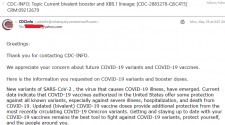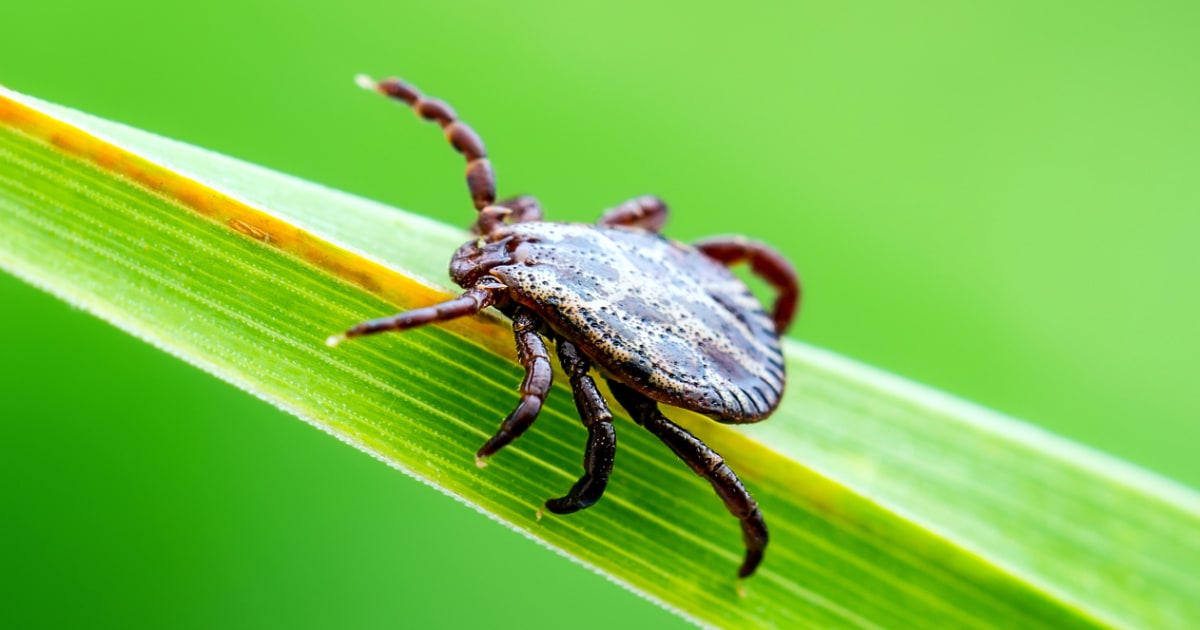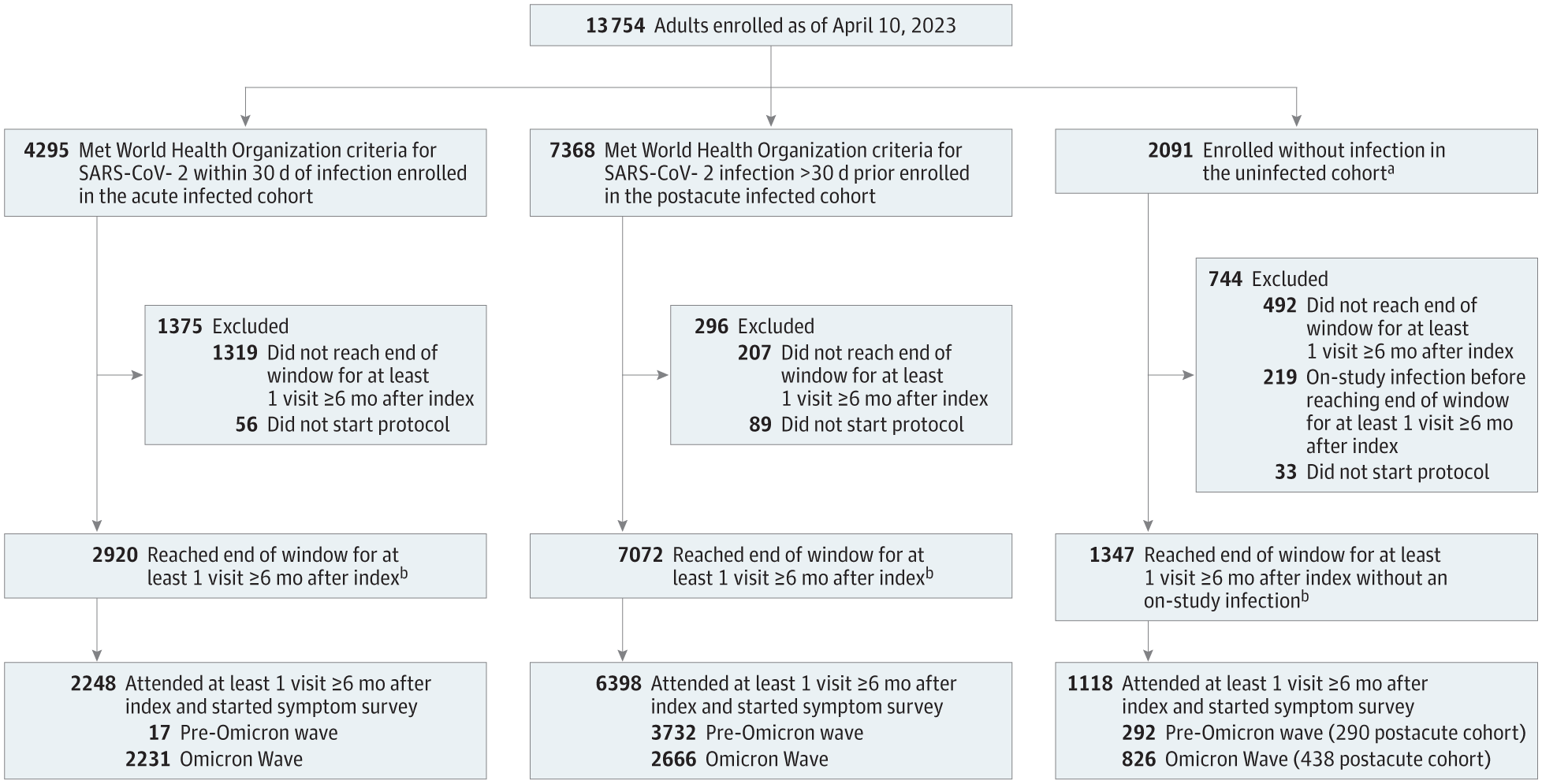Gemmie
Clam dip nose
- Joined
- Feb 4, 2014
- Messages
- 5,327
- Reaction score
- 36,118
You are most welcome. I hope you have a safe and cootie-free trip.Thanks for the links!
You are most welcome. I hope you have a safe and cootie-free trip.Thanks for the links!
Wow... I got an answer this morning, even though it's a holiday! My Q was "is the current bivalent booster doing any good if it's not targeting what's currently going around (XBB.1)? Hopefully it's still good at preventing hospitalization, serious illness and death, but I'm not completely sure about that."Just an update on my earlier post and my question at the bottom... "is the current bivalent booster doing any good if it's not targeting what's currently going around? Hopefully it's still good at preventing hospitalization, serious illness and death."
Post I'm talking about: Coronavirus COVID-19 - Global Health Pandemic #110
My update is that I have emailed the CDC Q&A line asking that Q and will get back to you all with an answer as soon as I have one.They've been super fast in the past but this is a holiday weekend...

You are very welcome. I like to help others when it comes to Covid, but my family and friends don't want to hear anything about Covid. I totally understand (Covid fatigue) but as I tell them... knowledge will help keep you safe.^ Thank you for sharing this information with us. I'm sure everyone appreciates your efforts.
Thank you for posting the CDC’s response. Due to my age and some health conditions, I choose to mask when in close confines, frequent handwashing, and stay boosted. I plan on getting the newest booster when we're nearing the fall.Wow... I got an answer this morning, even though it's a holiday! My Q was "is the current bivalent booster doing any good if it's not targeting what's currently going around (XBB.1)? Hopefully it's still good at preventing hospitalization, serious illness and death, but I'm not completely sure about that."
Here it their response. Due to there being links in the response I'm posting a SS of the top of the email to prove the source is the CDC, but then I'll copy and paste the text of the entire response below the SS proof so you can have access to their links.
View attachment 425275
Thank you for contacting CDC-INFO.
We appreciate your concern about future COVID-19 variants and COVID-19 vaccines.
Here is the information you requested on COVID-19 variants and booster doses.
New variants of SARS-CoV-2 , the virus that causes COVID-19 illness, have emerged. Current data indicate that COVID-19 vaccines authorized in the United States offer some protection against all known variants, especially against severe illness, hospitalization, and death from COVID-19. Updated (bivalent) COVID-19 vaccine doses provide additional protection from the most recently circulating COVID-19 Omicron variants. Getting and staying up to date with your COVID-19 vaccines remains the best tool to fight against COVID-19 variants, protect yourself, and the people around you.
CDC continues to investigate how the effectiveness of COVID-19 vaccines is affected by different variants of the virus that causes COVID-19. For more information, please visit the CDC website: Coronavirus Disease 2019 (COVID-19)
Scientists are currently investigating Omicron, its sublineages, and other potential variants, including how vaccinated people will be protected against severe illness, hospitalization, and death. CDC recommends that everyone 6 months and older protect themselves from COVID-19 by getting vaccinated. CDC recommends everyone ages 6 months and older receive at least one updated (bivalent) mRNA COVID-19 vaccine . Vaccination remains the best public health measure to protect against severe health outcomes, and slow the spread of SARS-CoV-2.
All COVID-19 vaccines authorized in the United States are effective at preventing severe illness, hospitalization, and death, including infections caused by emerging variants. Some people may still get a COVID-19 infection after vaccination. However, these people are much less likely to experience severe health outcomes than people who are unvaccinated.
To learn more, these additional links might also have relevant information for you. The CDC website is updated regularly, please check back to get most up to date information.
CDC Resources
COVID-19 Vaccines Work
COVID-19 Vaccination
What You Need to Know about Variants
Coronavirus Disease 2019 (COVID-19)
Understanding Variants
https://www.cdc.gov/coronavirus/2019-ncov/variants/understanding-variants.html
We hope this information is helpful. Thank you for contacting us.
Sincerely,
George
CDC-INFO Correspondence Team
Yes--that sentence you bolded seems to be the best answer available for now. Thanks for the link to that helpful WaPo article.Since I don't feel the answer I got in my above post easily answered my question... I Googled for it and got:
The new booster shots are bivalent, meaning they are designed to protect against both the original strain and the BA.5 omicron subvariant that caused most infections over the summer. The latest data shows that the booster protects people from getting sick with XBB.1.5 about as well as it did against BA.5.
...which is more to the point than all the info I got from the CDC. And as you're all aware, the current bivalent booster targets BA.4 & BA.5, as well as the original strain. (Source for this comment)
Source: https://www.washingtonpost.com/health/2023/01/25/covid-bivalent-booster-xbb15-infections/
ETA - there are a lot of good links in the WP link above.
With regard to travelling, at least by plane, I was pleased to learn that our friends who went to Beijing in mid-April only ended up getting Covid about three weeks after arriving in Beijing, in spite of a 13-hour plane trip to get there.Yes--that sentence you bolded seems to be the best answer available for now. Thanks for the link to that helpful WaPo article.
After getting the bivalent vaccine in mid September, I got Covid in late December--around 3 months after the shot. My symptoms were mild, fortunately. Of course I have no idea which variant I had. Since DH and I are in our late 70s and will be traveling in July, we will get another bivalent shot probably this week and hope for the best.

Fascinating article! Johnson's Twitter post says "We believe they are from patients with very long COVID infections."Speaking of Covid found in wastewater testing... I just saw this (not sure how they know it's 1 person, but I'm sure they have a way or they wouldn't state that):
Earlier this year Marc Johnson, a professor of molecular microbiology and immunology at the University of Missouri School of Medicine, took to social media with an appeal: "Help me solve a COVID cryptic lineage mystery," he wrote on Twitter.
Johnson told Insider that he was looking through a database of COVID samples when he came across a brand-new version (or, "lineage") of the virus. There were massive amounts of this unique strain — all coming from a single mystery person in Ohio.
Johnson told Insider that he has been identifying "cryptic" COVID lineages in wastewater around the country since 2021. These are strains "that don't match anything we've seen before," he said, showing SARS-CoV-2 still has some tricks up its sleeve and there's plenty we don't know.
While these cryptic strains have only been identified in wastewater, they could be harbingers of variants to come. Long before Omicron emerged, researchers were collecting samples of COVID that they didn't recognize — cryptic lineages that we now understand to be similar to Omicron, according to a preprint paper (not-yet-peer-reviewed) published last month by Johnson and his team.
It makes me wonder (and I can't get Goog to understand me and return an answer) if a single person can shed SO much into the wastewater, would that person be SUPER contagious? Like every exhalation of breath would be so virus packed that you could practically see it? (sorry about the exaggeration there. lol) I'm thinking likely not as there'd be other indications, like huge spikes in cases emanating from wherever this person is. At least I hope they aren't super cootiefied. It's very interesting that a single person can shed so much. I really hope they are a handscrubber. So many simply leave the bathroom without washing, or doing a so-so job of it.Fascinating article! Johnson's Twitter post says "We believe they are from patients with very long COVID infections."
Another excerpt:
The first cryptic COVID lineage Johnson found, in 2021, was a classic example of his discoveries. There was so much virus in the wastewater that he thought it was coming from a nursing home, or maybe an animal reservoir like a dog shelter. But his team traced it to a single office building in Wisconsin with about 30 employees, they wrote in the preprint paper.
"I didn't believe a person could shed that much," Johnson said.
All the workers in the building were notified and able to get tested. Eventually, the lineage disappeared from the wastewater.
I don't know the answer to your question. But the abstract from the paper Marc Johnson described is below. I used red font to highlight the "Interpretation" part of the abstract. The authors don't seem to address whether the person would be contagious, but I read a few things online that suggest people with long covid would not be contagious as long as they have a negative Covid test. But I do find this issue confusing.It makes me wonder (and I can't get Goog to understand me and return an answer) if a single person can shed SO much into the wastewater, would that person be SUPER contagious? Like every exhalation of breath would be so virus packed that you could practically see it? (sorry about the exaggeration there. lol) I'm thinking likely not as there'd be other indications, like huge spikes in cases emanating from wherever this person is. At least I hope they aren't super cootiefied. It's very interesting that a single person can shed so much. I really hope they are a handscrubber. So many simply leave the bathroom without washing, or doing a so-so job of it.
ome 15% of men didn’t wash their hands at all, compared with 7% of women. When they did wash their hands, only 50% of men used soap, compared with 78% of women.
Overall, only 5% of people who used the bathroom washed their hands long enough to kill the germs that can cause infections.
[...]
A bigger study published in 2009 that used more high tech methods at a busy highway rest stop in the UK was equally, if not more, damning.
[...]
“If there were no people around, people tended to zap out with no one noticing.”

I've been super careful about using my shirt to open doors my entire adult life due to a conversation with my brother-in-law who's an OBGYN. I also learned to flush a public toilet with my foot and the proper handwashing techniques from my NP daughter. Am I obsessed, you bet.It makes me wonder (and I can't get Goog to understand me and return an answer) if a single person can shed SO much into the wastewater, would that person be SUPER contagious? Like every exhalation of breath would be so virus packed that you could practically see it? (sorry about the exaggeration there. lol) I'm thinking likely not as there'd be other indications, like huge spikes in cases emanating from wherever this person is. At least I hope they aren't super cootiefied. It's very interesting that a single person can shed so much. I really hope they are a handscrubber. So many simply leave the bathroom without washing, or doing a so-so job of it.
ome 15% of men didn’t wash their hands at all, compared with 7% of women. When they did wash their hands, only 50% of men used soap, compared with 78% of women.
Overall, only 5% of people who used the bathroom washed their hands long enough to kill the germs that can cause infections.
[...]
A bigger study published in 2009 that used more high tech methods at a busy highway rest stop in the UK was equally, if not more, damning.
[...]
“If there were no people around, people tended to zap out with no one noticing.”
While some may, I certainly don't find you obsessed. You're what I call "germ smart" way upthread. Here's my post on the subject:I've been super careful about using my shirt to open doors my entire adult life due to a conversation with my brother-in-law who's an OBGYN. I also learned to flush a public toilet with my foot and the proper handwashing techniques from my NP daughter. Am I obsessed, you bet.

 www.websleuths.com
www.websleuths.com
Speaking of being "germ smart"... I've passed on birthday cake long before Covid hit. It's a basic duh (to me) that people are spraying it with any germs they may have! That includes the common cold, flu, etc. Seriously! It would be like having someone else blow on your dinner plate for you to cool it down! You wouldn't let someone do that. Or, if I really want a piece, I'll scrap off the frosting since that's where all the potential cooties are. I just find the habit gross. It, like handshaking, needs to go to the wayside. And handshaking not just for the germs that might be on someone's hands, but some tend to do the vise grip shake, and you never know who will do that!I've been super careful about using my shirt to open doors my entire adult life due to a conversation with my brother-in-law who's an OBGYN. I also learned to flush a public toilet with my foot and the proper handwashing techniques from my NP daughter. Am I obsessed, you bet.

 www.websleuths.com
www.websleuths.com

I prefer the new name - Postacute Sequelae instead of Long Covid- It sounds much more serious- as it definitely is very serious.New name for long covid, in case anyone missed it:
postacute sequelae of SARS-CoV-2 infection (PASC)
“.....A framework for identifying PASC cases based on symptoms is a first step to defining PASC as a new condition. These findings require iterative refinement that further incorporates clinical features to arrive at actionable definitions of PASC.....”

Development of a Definition of Postacute Sequelae of SARS-CoV-2 Infection
This study aims to develop a definition of postacute sequelae of SARS-CoV-2 infection (PASC) based on self-reported symptoms and describe PASC frequencies across cohorts, vaccination status, and number of infections using a cohort of adults with and without SARS-CoV-2 infection.jamanetwork.com
—-
Episode 132: Looking in the Windows
In this episode, Dr. Osterholm and Chris Dall discuss the latest data on long COVID, bivalent boosters, and mpox. Dr. Osterholm also shares the feedback we've received from our listeners on what this podcast will look like going forward. COVID is coming back in China; lockdowns are not (Buckley...www.cidrap.umn.edu
